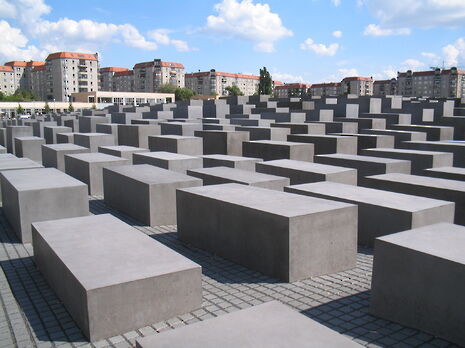‘Yolocaust’ isn’t satirical – it’s disrespectful
A satirical movement based on taking humorous photos at the holocaust memorial is an insensitive way to remember this tragedy, writes an anonymous columnist

The Berlin Holocaust Memorial has recently been the site of controversy. Made up of grey concrete blocks representing the mass graves of 6 million victims of the Holocaust, it is a place of quiet reflection for some – but as it is also a public park, it’s a place for much else. Whether it’s respectable to jump around, have picnics and take ‘humorous’ photos on the metaphorical gravesite of 6 million people has been understandably controversial.
I must admit that I come down firmly on the judgemental side of this controversy. This might be because I don’t have a sense of humour, or because I’m actually the intolerant one by not tolerating the intolerant, or because I just hate fun, or whatever arguments the free speech warriors now favour. The Holocaust was a tragedy of unimaginable proportions, and at the risk of sounding like a ‘liberal special snowflake social justice warrior’, it does hurt me to see its memory disrespected or plain ignored.
But seeing as this trivialisation and disrespect is not going away, to me, the more important question is how I and other Jews ought to react when it inevitably happens. Blame or education? The devastation of the Holocaust is with me every day, but just like I don’t think about the Armenian genocide or the transatlantic slave trade every day, I do understand that even the most tragic historical events can easily seem distant and forgettable with no personal connection to them. I can sympathise that people aren’t intending to make light of the Holocaust. But while I certainly prefer the tourist using the Holocaust as a social media aesthetic to the neo-Nazi who denies that it ever happened, good intentions only go so far.
The Israeli-German satirist Shahak Shapira doesn’t share my ambivalence on blaming the various smiling tourists of the memorial. In his project "Yolocaust", Shapira has gathered the photos of various people at the memorial enjoying yoga, taking funny pictures with their friends or jumping from block to block. The pictures show varying levels of insensitivity – from fairly neutral smiling selfies to the horrible caption “Jumping on dead jews”. Upon bringing the cursor on these pictures, this Instagram caption is interpreted literally. The photos become fused with grainy pictures of corpses – the dead malnourished Jews that Berlin’s great concrete blocks represent. The resulting photos portray literal grave-desecration, implying that such behaviour at the memorial is not far different.
I have my problems with the piece, but not for the reasons often expressed. I don’t buy the standard line about the people in the photos “respecting the dead with joy”. There’s nothing respectful about laughing on graves – death is sad, and it should be. In fact, I don’t think respecting the victims of a genocide is ever just about the dead. There are few remaining survivors of the Holocaust, but the historical importance of genocides transforms more than those who are directly affected.
“The Holocaust is a reminder not just to Jews, but all oppressed minorities, of the terrifying power of racial hierarchy and structural violence.”
It’s cute to think that resisting such hatred with love and rainbows is the solution, but when it’s still difficult for any minority to feel truly safe, ‘subversive’ acts of joy run the risk of trivialising tragedy. The reality is that the same forces behind the Holocaust haven’t really gone anywhere. And this trivialisation can usher in the (rather pleasant) illusion that minorities are no longer in danger.
Still, I’m not sure how I feel about Shapira’s piece. I’m not a fan of public shaming as a form of revenge, but I can’t help but be disgusted by the insensitivity of some of these pictures. Additionally, it seems that the mission of"Yolocaust", like much bad modern ‘satire’, is more in the realm of shocking and offending rather than any actual political goal. It should certainly motivate people against trivialising the memorial, but I doubt that it will do much else. While I feel Shapira’s anger I can’t help feeling that this anger could be channelled to more productive goals than the public shaming of (plausibly) well-meaning idiots. I don’t mean to say that minorities should always act like the productive adult, and refrain from getting angry at ignorance. Minorities don’t owe education to anyone. But the political pragmatist in me knows that getting mad at trivial disrespect like this will solve none of the problems that face Jews or any other minority. Shapira seems content with that.
Even if people learn to treat Berlin’s memorial with some seriousness, the alt-right ghoul Steve Bannon still sits in the White House as chief strategist, swastika-graffiti will still come to cover synagogues and anti-Semitic hate crimes will go on. The "Yolocaust" project might be a good reminder of the Holocaust’s terror, but not in any directed way. I do see photo-ops on the metaphorical gravesite of 6 million as stupid and trivialising. But I see the lack of directed political action against racial hierarchy as a significantly greater disrespect.
 News / Judge Business School advisor resigns over Epstein and Andrew links18 February 2026
News / Judge Business School advisor resigns over Epstein and Andrew links18 February 2026 News / Hundreds of Cambridge academics demand vote on fate of vet course20 February 2026
News / Hundreds of Cambridge academics demand vote on fate of vet course20 February 2026 News / Gov grants £36m to Cambridge supercomputer17 February 2026
News / Gov grants £36m to Cambridge supercomputer17 February 2026 News / CUCA members attend Reform rally in London20 February 2026
News / CUCA members attend Reform rally in London20 February 2026 News / Union speakers condemn ‘hateful’ Katie Hopkins speech14 February 2026
News / Union speakers condemn ‘hateful’ Katie Hopkins speech14 February 2026









